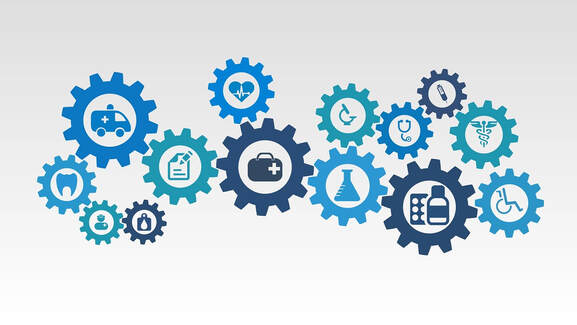What is Systems Thinking?
|
It is a paradigm or perspective that considers connections among different components, plans for the implications of their interaction, and requires transdisciplinary thinking as well as active engagement of those who have a stake in the outcome to govern the course of change.
Leischow SJ, Milstein B. 2006.
A set of elements or parts that is coherently organized and interconnected in a pattern or structure that produces a characteristic set of behaviours, often classified as its “function” or “purpose””.
Meadows DH. 2008.
|
Why is systems thinking needed?
Studies have shown that variations in clinical practice often lead to suboptimal care, especially when clinicians deviate from evidence-based practice guidelines. Implementation science addresses the gaps between the interventions that research have shown to be effective and the dissemination and delivery of those interventions into practice.
How does systems thinking fit into CME/CE and QI?

CME/CE providers must apply principles of systems thinking when developing team-based interprofessional educational activities. Health care is a complex adaptive system and clinicians must understand the connections, relationships, and dynamics of different components that impact patient outcomes. The application of systems thinking becomes a crucial framework for achieving sustainable systems-level quality improvements.
CME = continuing medical education
CE= continuing education
QI = quality improvement
CME = continuing medical education
CE= continuing education
QI = quality improvement
Six Domains of Healthcare Quality:
- Safe: Avoiding harm to patients from the care that is intended to help them.
- Effective: Providing services based on scientific knowledge to all who could benefit and refraining from providing services to those not likely to benefit (avoiding underuse and misuse, respectively).
- Patient-centered: Providing care that is respectful of and responsive to individual patient preferences, needs, and values and ensuring that patient values guide all clinical decisions.
- Timely: Reducing waits and sometimes harmful delays for both those who receive and those who give care.
- Efficient: Avoiding waste, including waste of equipment, supplies, ideas, and energy.
- Equitable: Providing care that does not vary in quality because of personal characteristics such as gender, ethnicity, geographic location, and socioeconomic status.
Q Synthesis LLC
Advancing interprofessional collaborative practice by applying principles of systems thinking, implementation science, and health services research
Advancing interprofessional collaborative practice by applying principles of systems thinking, implementation science, and health services research
|
Q Synthesis LLC
13 Summit Square Ctr #143 Langhorne, PA 19047 Phone: (215) 867-9122 Fax: (888) 409-9721 Email: [email protected] |
Sign up to receive updates:
|

